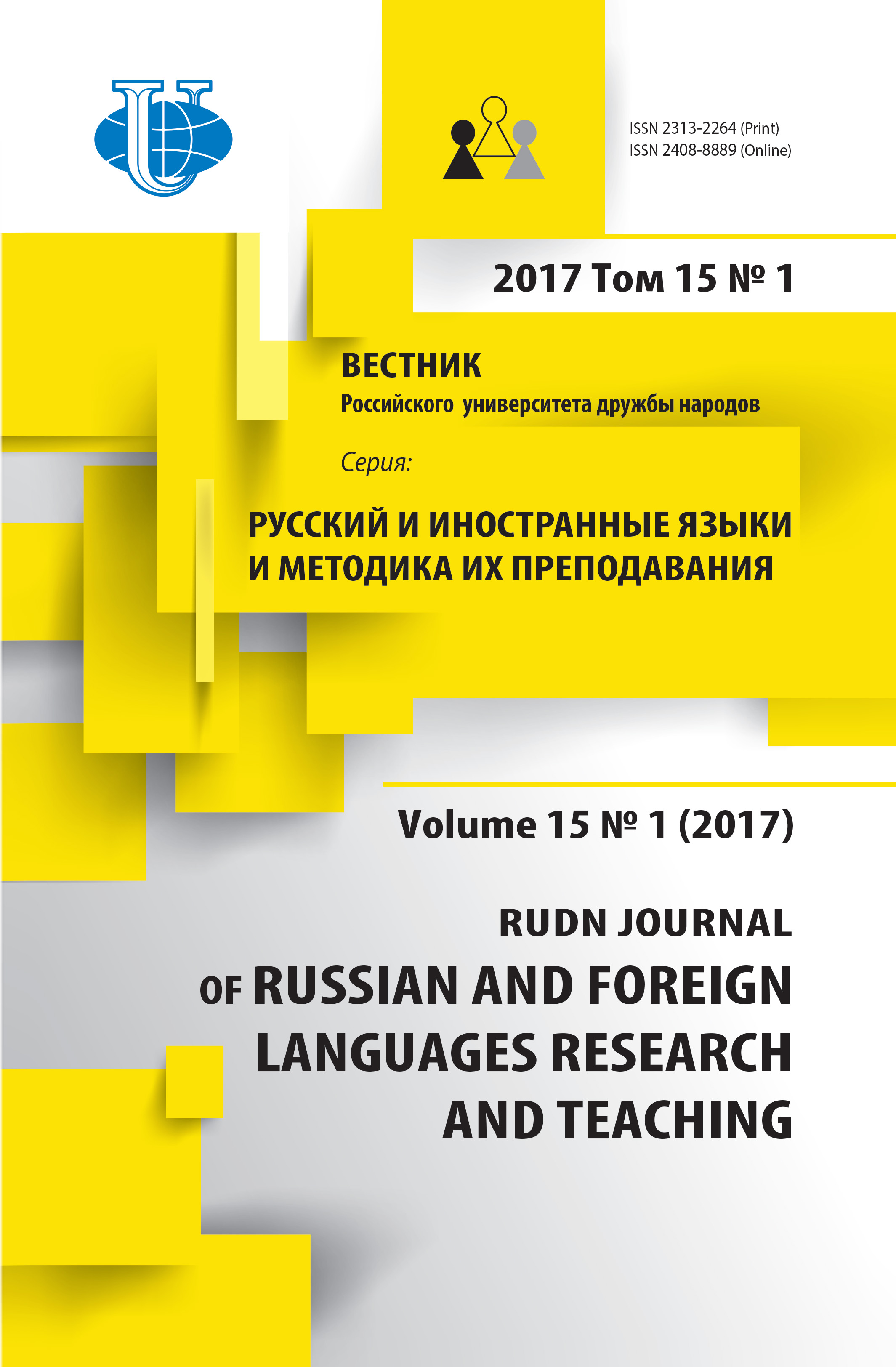CLASSROOM DISCOURSE AS INNOVATIVE PLATFORM FOR DEVELOPING FOREIGN STUDENT LINGUISTIC PERSONALITY
- Authors: Caylak H.1, Muhammad L.P.1
-
Affiliations:
- Karadeniz Technical University
- Issue: Vol 15, No 1 (2017)
- Pages: 77-90
- Section: Articles
- URL: https://journals.rudn.ru/russian-language-studies/article/view/16031
- DOI: https://doi.org/10.22363/2313-2264-2017-15-1-77-90
- ID: 16031
Cite item
Full Text
Abstract
The issue of this article is creating innovative learning technologies, specifically, student-oriented teaching Russian to foreigners.The significance of the research lies in the fact that its study of classroom discourse as an innovative platform for developing harmonious linguistic personality acquiring a foreign language. The expected result of the study is creating an innovative anthropologically oriented Russian language training model for Turkish students at the primary training stage. Placing the inofon linguistic personality, its interaction with other participants of communication, including teacher as the reference point of the design, makes the model unique.The aim of this study is to show that consideration of discourse properties might encourage instructors to implement learning strategies based on communicative interaction between teacher and students.The main research methods of the study are practical methods: observation of communicative interaction between participants during the educational process, interviews of students and teachers and personal teaching experience. Real Russian language educational process for Turkish students, as well as video and audio recordings of the process are the main material for the current study.The authors have found integrating and distinctive features of pedagogical/classroom discourse in Turkish classroom. The distinction between those attributes can help teachers to use the phenomenon of classroom discourse as an innovative platform for the creation of fundamentally new techniques, including methods based on our learning model focused on linguistic personality of Turkish students at the primary training stage.The study reveals the importance of linguistic and didactic differentiating components of classroom discourse of Turkish students at the primary training stage. It allows to draw a conclusion about feasibility of further studies of classroom discourse from the perspective of inofon linguistic personality developing.
About the authors
Hanifa Caylak
Karadeniz Technical University
Author for correspondence.
Email: caylakhanife@gmail.com
candidate of philological sciences, lecturer of department of Russian language and literature of the Faculty of Humanities of KTU
Trabzon, Turkey, 61080Ludmila Petrovna Muhammad
Karadeniz Technical University
Email: caylakhanife@gmail.com
Doctor of pedagogical sciences, Professor of department of Russian language and literature of the Faculty of Humanities of KTU
Trabzon, Turkey, 61080References
- Azimov Je.G., Shukin A.N. Novyj slovar’ metodicheskih terminov i ponjatij (teorija i praktika obuchenija jazykam) [New dictionary of methodological terms and concepts (the theory and practice of language teaching]. Moscow: Ikar, 2009. 448 p.
- Arutjunov A.R. Kommunikativnyj intensivnyj uchebnyj kurs RKI dlja zadannogo kontingenta uchashhihsja (metodicheskoe posobie) [Intensive communicative teaching course of Russian as a foreign language for a specific enrollment of students: resource book]. Moscow: IRJAP, 1989. 99 p.
- Leont’ev A.A. Jazyk i rechevaja dejatel’nost’ v obshhej i pedagogicheskoj psihologii [Language and speech activity in general and aducational psychology]. Мoscow — Voronezh, 2001. 448 p.
- Mets N.A., Mitrofanova O.D., Odincova T.V. Struktura nauchnogo teksta i obuchenie monologicheskoj rechi. [The structure of scientific text and monologue speech teaching]. Мoscow: Rus. jazyk, 1981. 141 p.
- Mitrofanova O.D., Kostomarov V.G., Vjatjutnev M.N., Sosenko Je.Ju., Stepanova E.M. Metodika prepodavanija russkogo jazyka kak inostrannogo. [Methods of teaching Russian as a foreign language]. Мoscow: Rus. jazyk, 1990. 269 p.
- Muhammad L.P., Ashchi M., Chajlak H. Skomoroshina. Ili prikljuchenija Bory. Urokspektakl’. Uchebnoe posobie po obucheniju russkoj razgovornoj rechi tureckih studentovfilologov (nachal’nyj jetap obuchenija). [“Skomoroshina” or the adventure of Bora. Lesson play. Teaching materials related with the spoken Russian for the Turkish philology students (primary training stage)]. Istanbul, 2016. 124 p.
- Muhammad L.P. Jazykovaja lichnost’ inostrannogo studentanefilologa nachal’nogo i srednego jetapov obuchenija. [Linguistic personality of the foreign nonphilology student at primary and secondary stages of education]. М.: IRJAP, 2003. 240 p.
- Chomsky N. New Horizons in the Study of Language and Mind. Cambridge: Cambridge University Press, 2002. 230 p.
- Jung K.G. Psihologicheskie tipy [Psychological types]. M.: AST, 2008. 761 p.
- Muhammad L.P., Chajlak H. Interaktivnye osobennosti jazykovoj lichnosti i problema funkcionirovanija mehanizmov anticipacii v processe raboty s tekstom. Elektronnyj nauchnoobrazovatel’nyj zhurnal [Interactive features of the linguistic personality and problem of functioning of the anticipation mechanisms in the process of working with a text. Electronic Journal of Research and Education]. «Avrasya Uluslararası Araştırmalar Dergisi». № 8. 2016. P. 31—50. http://www.avrasyad.com/OncekiSayilarDetay.aspx?Sayi=8
- Gal’perin I.R. Tekst kak ob”ekt lingvisticheskogo issledovanija [Text as an object of linguistic research]. Moscow: KomKniga, 2007. 148 p.
- Prohorov Ju.E. Dejstvitel’nost’. Tekst. Diskurs: Ucheb. Posobie. [Reality. Text. Discourse: textbook]. Мoscow: Flinta, 2011. 224 p.
- Arutjunova N.D. Diskurs. Lingvisticheskij jenciklopedicheskij slovar’ [Discourse // Linguistic encyclopedic dictionary]. M.: Sovetskaja encyclopedija, 1990. P. 136—137.
- Diskurs, rech’, rechevaja dejatel’nost’: funkcional’nye i strukturnye aspekty: Sb. obzorov / Redkol.: Romashko S.A. i dr. [Discourse, speech, speech activity: functional and structural aspects: Sb. Reviews collection]. Editorial board.: Romashko S.A. and etc. М.: INION RAN, 2000. 232 p.
- Karasik V.I. O tipah diskursa [About types of discourse]. Rezhim dostupa: http://ruslang.isu.ru/education/discipline/philology/disrurs/material/ material2/
- Karasik V.I. Rechevaja kommunikacija: diskursivnyj aspect. Jelektronnyj nauchnoobrazovatel’nyj zhurnal. [Speech communication: discursive aspect. Electronic Journal of Research and Education] VGSPU «Grani poznanija». № 1 (21). 2013. P. 32—34. www.grani.vspu.ru
- Makarov M.L. Osnovy teorii diskursa [Foundations of discourse theory]. Moscow, Gnozis Publ., 2003. 280 p.
- Muhammad H.I. Pragmaticheskij komponent «vzaimodejstvie» v auditornom diskurse. [The pragmatic component of “interaction” in classroom discourse]. Avtoref. diss. … kand. filolog. nauk. M.: Gos. IRJA im. A.S. Pushkina, 2006. 24 p.
- Sedov K. Diskurs i lichnost’: Evoljucija kommunikativnoj kompetentcii [Discourse and personality. The evolution of the communicative competence]. Moscow: Labirint, 2004. 320 p.
- Situacionnaja i lichnostnaja determinacija diskursa / Pod. Red. N. Pavlovoj, İ. Zachesovoj. [Situational and personal determination of discourse. Ed. N. Pavlova, I. Zachesova]. M.: Institut psihologii RAN , 2007. P. 205—224.
- Van Dijk Teun А. Discourse and Context. A sociocognitive approach / А. Van Dijk. Cambridge: Cambridge University Press, 2008. Р. 22—72.
Supplementary files














